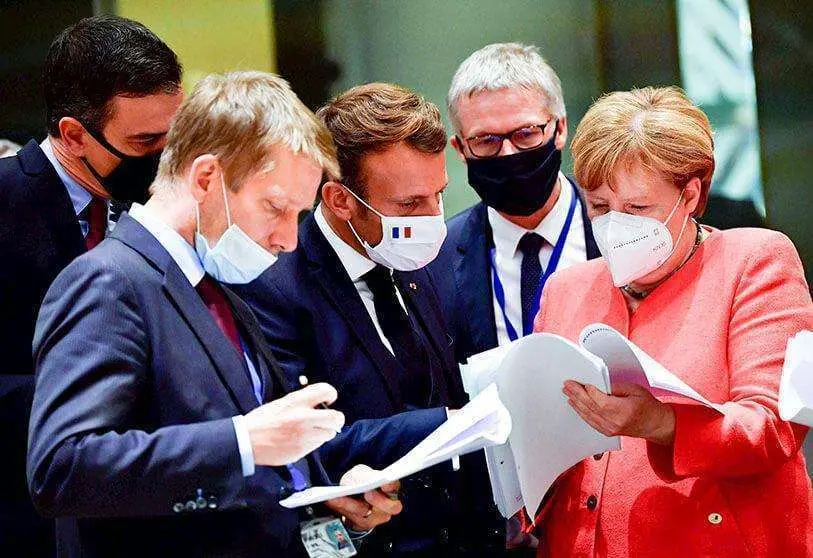Post-Brexit: from coexistence to partnership

Consummate divorce. The United Kingdom and the European Union, no longer sleeping together since 52% of those who voted in the 2016 referendum won the game, have decided to separate their paths from zero hours on January 1, 2021. Definitely? That is impossible. The geography does not change, so that British and European houses will continue to be bound by more barriers that have been imposed on each other in the economic provisions of their divorce agreement.
It was our famous philosopher, José Ortega y Gasset, who coined the term "conllevanza" to describe the possible better relationship of Catalonia with the rest of Spain, once the impossible independence had been ruled out. It may also be appropriate to frame the one that will henceforth continue to unite the EU with the first of its members, and not precisely smaller in size and importance, that has decided to leave the common home.
Despite the fact that the post-brexit agreement is more than two thousand pages long, there is still a lot of small print to be developed, and above all to be reflected in the daily practical relationship between the two sides of the English Channel. The images of the thousands of trucks stranded on the access roads to the Eurotunnel and the British ports, while the country's supermarkets were being emptied of their products at full speed, are an appetizer.
The EU, relieved but fed up with such a difficult divorce, has preferred not to draw blood and to praise that "we are laying the foundations for a new chapter in our relationship" (Angela Merkel). Obviously, no enthusiasm in the president of the European Commission: "This agreement allows us to leave the Brexit behind" (Ursula von del Leyen). Deep breath of the Irish Prime Minister, Micheal Martin: "It is a good compromise and a balanced result".
Phrases of commitment that allow Boris Johnson, "perhaps the most amoral and lying leader that Great Britain has had since Henry VIII" according to Xavier Mas de Xaxás, to proclaim to the four winds that London "has recovered the reins of its destiny". Well, okay.
The reality is a little more crude. Its access to the single European market, to which it allocates almost half of its exports, is preserved by European rules. Its pretensions to make its companies more advantageous by means of softer and more flexible regulations than the European ones in matters of the environment, workers' conditions and public subsidies, have crashed against the firmness of a European Union that knows that its main treasure is precisely its extremely guaranteed single market.
Gibraltar, among the pending bangs
Johnson had gone over with weapons and baggage to the large ranks of those who aspire to disintegrate the EU, taking advantage of the fact that Donald Trump had taken the lead in such a movement. The promises of the one who said that London could exchange its great advantages with the EU for a paradisiacal trade agreement with the United States, have all the traces of being forgotten with the next tenant of the White House, Joe Biden, who, with the precautions that are imposed, will once again count on the European Union and will re-establish the bridges, given the geopolitical and commercial war that is already being waged with China.
As in any separation, the abandonment of a common goal and ultimately of facing the future with a single vision, weakens both parties. That one suffers more than the other is no more consolation than for fools or for those who cannot shake off their desire for revenge. Hopefully, the United Kingdom will do well, although there is much doubt that it will achieve the fortunate future that Johnson predicted. The EU will not be able to lower its guard under any circumstances, and maintain the same spirit and solidity that has been maintained by the negotiating team led by the Frenchman Michel Barnier, backed of course by 27 heads of state and government who have been convinced forever - by hanging by force - that every man for himself was a guarantee that everyone would drown.
There are still a lot of loose ends to be developed, although this time everything will presumably be quicker: ratification by the Westminster Parliament and that of the Europarliament, which will give its agreement when at least two months have passed since its provisional entry into force on January 1. This time, however, it will not be necessary to ratify the agreement in a timely manner by up to 42 national and regional parliaments (yes, it is that atomized, despite all Europe). Financial services, for example, are ignored in the agreement, that is, what will happen to the City, which alone contributes 7% of the British GDP. And also Gibraltar, an issue that the EU is leaving entirely in the hands of Spain and its bilateral negotiations with the United Kingdom.
A probably unique opportunity to change the dynamic that has led to the existence of a colony on European soil, with the third highest income per capita in the world, surrounded by a region, the Campo de Gibraltar, with one of the highest rates of poverty and crime, because of the substitute drug trafficking, of the entire European Union. For the time being, let us hope that this opportunity is not wasted, because if we do not take advantage of it, we may have to wait at least another three centuries of frustration.



